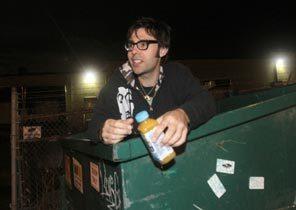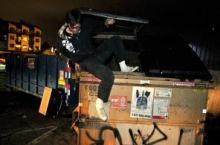A University of Washington anthropology student is exploring the city's Dumpster-diving culture to gain a better understanding of food that is wasted.
David Giles' forays into area Dumpsters are part of his dissertation research in perceptions about edible food.
He's an anthropology grad student, so David Giles has one foot in the ivory tower. But the other one? It's squarely in the garbage.
For his doctoral thesis, the University of Washington student is examining how cultural assumptions of what is appetizing lead to the disposal of surplus, edible food. He's become a pro at vaulting into Dumpsters, picking through their contents and befriending people who make a meal of other people's leftovers.
In short: Giles is a Dumpster-diver.
The 31-year-old Australia native hopes his work will raise awareness of the volume of edible food that gets thrown out and will prompt people to think about how they might get more food into the hands of the hungry — perhaps by giving it to a food bank or handing it out to the homeless in a park.
"The first thing that hits you in the face is how good the stuff in the Dumpster is," Giles said. "It's thrown away because it's not profitable."
For Giles, the insight he's gained from leaping into the trash raises important philosophical questions: "What makes a thing valuable, and suddenly not valuable?"
Giles became interested in Dumpster-diving (which, in most cases, is legal) as an undergraduate at the University of California, Davis, when he began rescuing furniture out of Dumpsters. He soon became aware of a societal subculture: a network of people who sustain themselves on throwaways.
When he began working on his doctorate in anthropology, he decided to make a more scholarly exploration of the availability of edible discarded food. He also explored the Dumpster-diving culture, doing extensive interviews with people who feed themselves this way. After he finishes his thesis next year, he plans to write a book about his research.
Giles' academic adviser, associate professor of anthropology Danny Hoffman, said he's learned a lot about Seattle and its subcultures through Giles' work. "He's definitely living out the project, and that's part of what makes him a great anthropologist," he said.
Right place, right time
One evening in mid-October, Giles went on a Dumpster-diving trip in Sodo, within sight of Safeco Field. Several of the Dumpsters here serve as the last stop for food from the city's most upscale grocery chains.
Making a quick survey over the open top of a Dumpster that smelled faintly of rotting food, Giles placed his hands on the edge and vaulted into the container. He ducked down and disappeared from sight for a moment, then came up with an unopened plastic container of juice — one of those exotic-flavored varieties that sells for more than $3 apiece.
On the right night, this Dumpster will be half-full of such bounty — juices that have not yet reached their expiration date but have been cleared from the shelves to make way for fresher foods. "On the right day, it's fantastic," Giles said.
Next up: a Dumpster just north of the University District, where a fresh-produce stand has discarded plum tomatoes and strawberries that are slightly overripe or flawed.
"This is a perfectly good onion," he said, holding up the vegetable. "But it's ugly." In another Dumpster, he found a pumpkin with a smashed stem, some wilted asparagus and a large quantity of romaine lettuce. (Not a fan of lettuce, Giles ignored the romaine.)
When he gets his vegetables home, he'll usually soak them in a sinkful of water to which he adds a half-cup of bleach, then rinse them.
Giles has gotten his monthly grocery bill down to $100, but he knows people in the Dumpster-diving community who spend no money on food at all. That kind of dedication to finding food discards is time-consuming, though, and it helps to know the Dumpster dumping schedule in order to do it right, he said.
Who else Dumpster-dives? Giles describes a counterculture group: students, punk rockers, left-wing activists and people who can't be pigeonholed into any group at all.
Food-bank alternative
Shelly Rotondo, executive director of Northwest Harvest, a food bank with offices around the state, agrees with Giles that a lot of food goes to waste. By one estimate, 25 percent of produce is wasted.
But she thinks food banks are doing a good job of capturing food and getting it into the hands of the hungry, and that most waste now comes from households or restaurants. Rotondo said fruits and vegetables with flaws and imperfections never even reach the grocery-store shelves — they're sent by distributors to the food bank.
"Northwest Harvest does fantastic work," Giles agreed. And yet, he's seen the Dumpster evidence that lots of food ends up in the trash. He has not tried to quantify the amount of edible food that is thrown out in the Seattle area.
Dumpster discards and food banks have a shared history. The first food bank in the nation was founded when a community volunteer discovered that grocery stores were disposing of food that had damaged packaging or was near expiration, Rotondo said.
"My sense is people are paying good attention to this," Rotondo said. "There is a system in place, and it's working pretty well."
The food bank is careful not to serve its clients food that the employees would not eat themselves. That can mean screening out some food that might actually be OK to eat, she said.
Giles hopes to encourage people to think a little harder about food that could be donated to the food bank, or even just given away to hungry strangers. He often works with a group, Food Not Bombs, that collects and cooks discarded produce from farmers markets and other sources, and serves it to homeless people in local parks. Giles also does public lectures at the UW on his work.
Hoffman said Giles is raising good questions about food waste, how it's generated and how it's discarded. "It forces you to think about how we establish value, and what happens to things that are labeled as unwanted and unworthy," he said.
"He's nobody's idea of a tweed jacket, pipe-smoking professor," Hoffman added. "He's doing work that's very socially relevant."
Katherine Long: 206-464-2219 or klong@seattletimes.com

